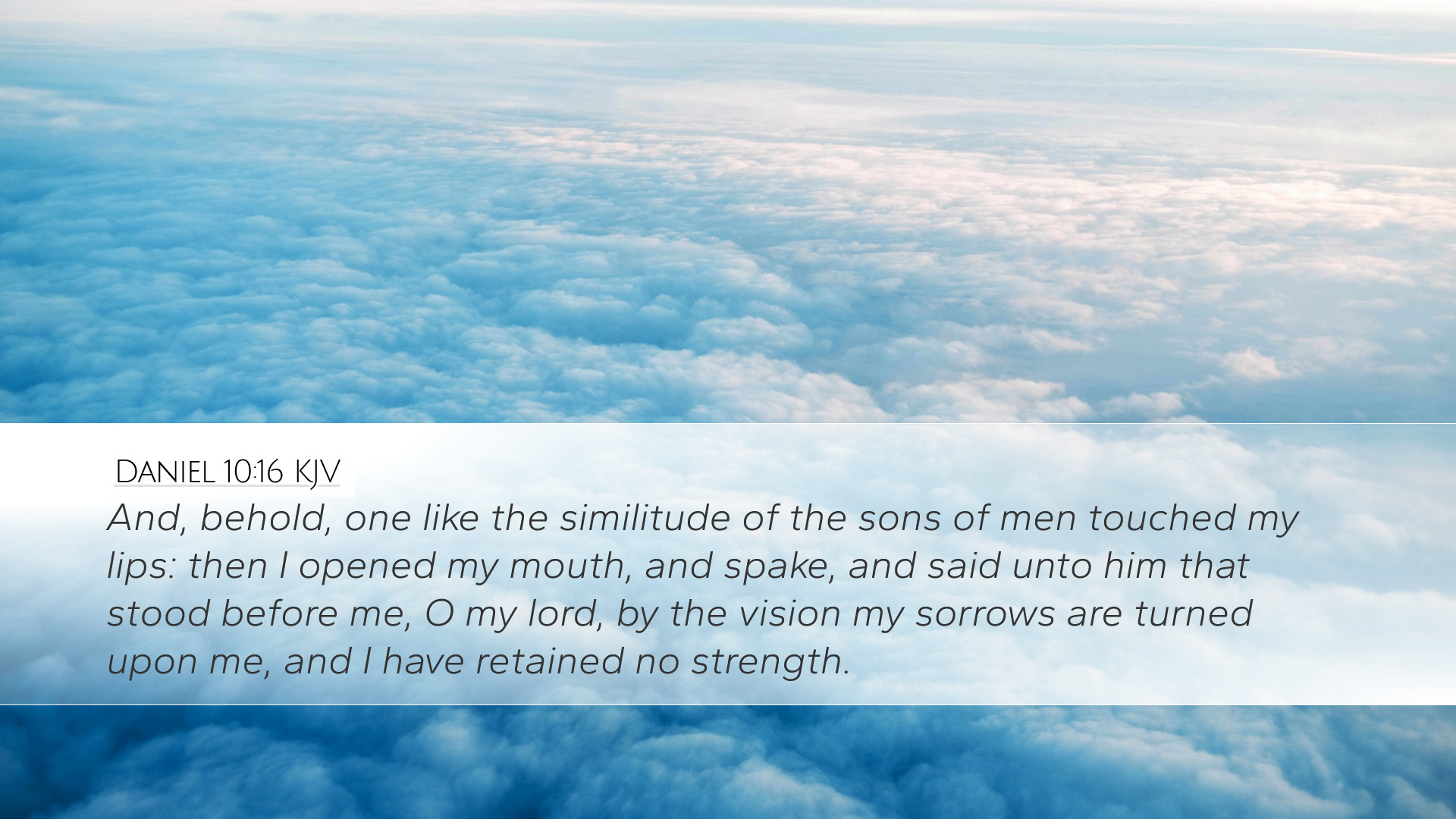Old Testament
Genesis Exodus Leviticus Numbers Deuteronomy Joshua Judges Ruth 1 Samuel 2 Samuel 1 Kings 2 Kings 1 Chronicles 2 Chronicles Ezra Nehemiah Esther Job Psalms Proverbs Ecclesiastes Song of Solomon Isaiah Jeremiah Lamentations Ezekiel Daniel Hosea Joel Amos Obadiah Jonah Micah Nahum Habakkuk Zephaniah Haggai Zechariah MalachiDaniel 10:16
Daniel 10:16 KJV
And, behold, one like the similitude of the sons of men touched my lips: then I opened my mouth, and spake, and said unto him that stood before me, O my lord, by the vision my sorrows are turned upon me, and I have retained no strength.
Daniel 10:16 Bible Commentary
Commentary on Daniel 10:16
Daniel 10:16 presents a profound moment where the prophet, having received a vision of immense significance, is struck by the gravity of this divine encounter. This verse reads:
"And, behold, one like the similitude of the sons of men touched my lips: then I opened my mouth, and spake, and said unto him that stood before me, O my lord, by the vision my sorrows are turned upon me, and I have retained no strength." (KJV)
Contextual Overview
In the context of the Book of Daniel, Chapter 10 serves as a transitional chapter that introduces profound revelations concerning Israel's future. Daniel, having fasted and prayed for three weeks, seeks understanding regarding the vision he received (Daniel 10:1). It is during this period of spiritual preparation that a celestial being appears, likely an angelic messenger, conveying God’s revelation.
Commentary Insights from Public Domain Sources
Matthew Henry's Commentary
Matthew Henry emphasizes the relational aspect of divine encounters. In his discussion on Daniel 10:16, he notes that the "touch" of the angel signifies both compassion and the impartation of strength to the weary prophet. Henry highlights that such encounters often leave individuals overwhelmed, as the presence of the Divine reveals one’s own fragility. The prophet's inability to stand and his sorrow illustrate the weight of spiritual revelation.
Henry elaborates that God often sends His servants messages through intermediaries, and it is in such moments that the human heart is laid bare. This, he believes, is a theme throughout Scripture, showcasing human vulnerability in contrast to the majesty of God.
Albert Barnes' Notes on the Bible
Albert Barnes, in his extensive notes, underscores the physical and spiritual implications of the phrase "like the similitude of the sons of men." This expression relates to the prophetic's experience of an angelic being that shares characteristics with humanity. Barnes posits that the reference to the "sons of men" serves to remind us of the incarnational aspect of divine interactions—reminding believers of Jesus Christ's identity as fully God and fully man.
- Divine Intimacy: This personalization in the angelic being fosters a profound sense of divine intimacy, inviting believers to approach God with reverence, yet with the assurance of His compassion.
- Human Weakness: Barnes explains that the acknowledgment of weakness comes when one's eyes are opened to the spiritual reality that surrounds them, making the need for divine empowerment evident.
Adam Clarke's Commentary
Adam Clarke provides a rich exploration into the emotional state of Daniel following this divine touch. He notes that Daniel's reaction—opening his mouth to speak—demonstrates an instinctual response of yearning for communication and understanding amidst his turmoil. Clarke suggests that this illustrates a deep need for communion with God, especially in times of distress.
Furthermore, Clarke points out the significance of Daniel’s “sorrows” as an indicator of his spiritual battle. He observes that the revelations of God often come with a burden—one that reveals sin, judgment, or the state of nations. Daniel's loss of strength serves as a metaphor for the exhaustion that follows intense spiritual warfare.
Theological Implications
This verse encapsulates several key theological themes relevant to pastors, students, theologians, and scholars:
- The Nature of Divine Revelation: The encounter emphasizes how God chooses to communicate with His people, often through intermediaries who convey His messages, strengthening the context of divine-human interaction.
- Human Vulnerability: Daniel's experience is a vivid portrayal of human frailty when confronted with the divine; a reminder that strength comes not from ourselves but from God's presence.
- Role of Intercession: Just as Daniel interceded for his people, this verse serves as a call for believers to engage in prayerful seeking of God’s wisdom, particularly during trying times.
Conclusion
Daniel 10:16 presents a rich tapestry of insight regarding the encounter with the divine. By studying the various commentaries of public domain scholars, we can glean not only historical context but also profound spiritual truths that resonate today. As Daniel was touched and transformed by his encounter, so too can believers be invigorated through their spiritual engagements with God.


